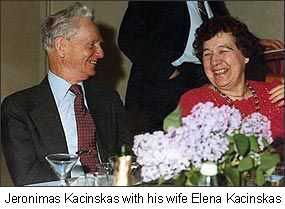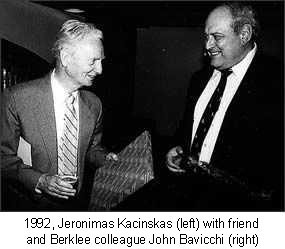Jeronimas Kačinskas is the oldest living Lithuanian composer residing in Boston, USA. On the occasion of his 94th birthday he was honoured by the Berklee College of Music with a special concert showcasing his compositions on April 8.
Prior to World War II, Kačinskas has been conductor of Lithuania's top orchestra, the Vilnius Philharmonic, and the Vilnius State Opera, conducting more than thousand concerts. At the time, he used some of the most advanced composing techniques. Alois Hába, with whom he studied microtonal composition in the 1920s, called Kačinskas his most gifted student. In 1936, Kačinskas applied to the International Society of Contemporary Music, asking to accept Lithuania as its member, and his request was complied with. In 1937, a festival of ISCM took place in Paris, and Lithuania was the first Baltic country to participate here, represented by composers Jeronimas Kačinskas and Vytautas Bacevičius. In 1938, Kačinskas'
Nonet, chosen by the jury and performed by the Czech musicians, became one of the highlights of the ISCM festival in London. The author was congratulated by composers from different countries, Béla Bartók among them.
Moreover, this composition had a colourful life later on. The manuscript was lost in the turmoil of the World War II. With the help of the Berklee alumnus Emil Viklicky, string and woodwind parts of
Nonet were located and retrieved from the shelves of a Czech archive in 1992 and returned to Berklee. Professor John Bavicchi recreated the score and generated new parts of the half-hour piece for its American premiere in 1993.
When the Russian Army annexed the country in 1944, Kačinskas and his wife Elena had to flee their home on foot. Abandoned their apartment, piano, and the rest of their belongings (the scores of Kačinskas' compositions among them), they walked for months, over 600 miles before reaching American-held territory in Germany, sleeping in barns, digging ditches to survive, and trying to escape both the Russian and German armies. They were taken in by American troops and sent to a displaced persons' camp. In 1949, the couple immigrated to the United States and headed to Boston where they found the friendly refuge of the Lithuanian community.
In Boston Kačinskas became organist and choir director of the Lithuanian church in South Boston and taught private students. Starting from 1952, he has been conducting different orchestras and choirs in the USA, performing in prestigious venues (Carnegie Hall among them). In 1967-86, Kačinskas taught composition and conducting at the Berklee College of Music. All that time his students and colleagues admired him for his excellent training. In 1991, Jeronimas Kačinskas was awarded the Lithuanian National Prize.
Honouring his lifetime achievements, his Berklee friends decided to present a special concert tribute to Jeronimas Kačinskas at the David Friend Recitall Hall on April 8. The concert was widely covered by the Boston media (the WBUR-FM news show 'Here and Now', April 5, and the Boston Glove, April 12). The composer's most recent work
2000 Year Anniversary of Jesus Christ's Holy Message to the People for brass octet was premiered by the ensemble of Berklee professors (cond. Louis Stewart). The acclaimed Esterhazy Quartet who where in residence at Berklee that week performed the
String Quartet No.4. And of course, the program has featured
Nonet, performed by the ensemble of Berklee professors (cond. David Callahan). With loving audience filling the hall and rousing round of applause after each piece, this event was an overall success and, according to Alan Resee, Trustee of Berklee College of Music, a wonderful day for all involved.
© Linas Paulauskis
Lithuanian Music Link No. 2
The new work presented joyous fanfare-like utterances. The string quartet, played handsomely by the visiting Esterhazy String Quartet, featured interesting pairings of instruments. And the 1938 Nonet seemed to reflect the somber mood of the time in which it was written. The first movement, in particular, was full of dark portent. [...] One can understand that Kačinskas' music - iconoclastic, personal, forward-looking - may not have been Stalin's cup of tea. But why it never became Boston's cup of tea is the real mystery here.
Boston Globe


